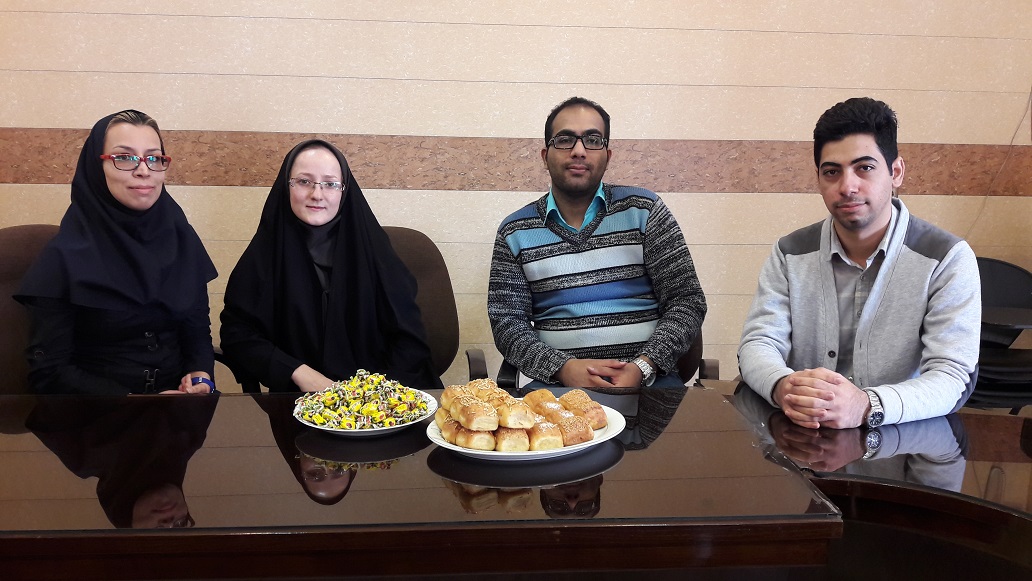 |
| Current Ph.D students From left: Neda Yaghoubi, Safieh Ebrahimi, Amir Yarahmadi, Farshad Mirzavi |
| General Description |
|
This program is mainly designed to train individuals capable of working in the medical diagnostic laboratories, teaching biochemistry, and conducting research in the related areas. They should be able to apply their expertise to resolve challenges in medical diagnostic laboratory and improving the quality of services by implementing guidelines. They will also be responsible for teaching biochemistry to the students in different levels of under- and postgraduate programs. The graduates are also expected to conduct research projects independently or as a post-doctorate researcher. |
| Requirements for the candidates |
|
You are welcomed to apply for the program if you have have a Master or equivalent degree in Clinical Biochemistry, Medicine, Biochemistry, Veterinary, Pharmacy, Nutrition or Medical Laboratory Sciences. Distinctive records and background knowledge in Biochemistry and metabolic disorders, physiology and Cellular and Molecular Biology are also required. |
| Duration: 8-10 semesters |
| Program Details | |||
| Admitted students are required to pass the following requirement. | |||
| Course Type | Comments | ||
| 1 | Prerequisite Subjects | 13 Credits | If required by the Educational Committee of the Department of Clinical Biochemistry, the students will be asked to take a number of these course as prerequisite for the mains core subjects. |
| 2 | Compulsory (Core) Subjects | 20 Credits | The students are required to pass all these subjects. |
| 3 | Elective (Non-Core) Subjects |
10 Credits | All the candidates are required to take at least 6 units from the subjects listed in this table. |
| 4 | Research thesis | 20 Credits | |
| Total |
50 credits |
||
| Note: Each Unit of course work equals 17 hours of lectures and 34 hours of Laboratory practice work. | |||
|
Prerequisite Subjects |
||||
| Course Name | Theory | Lab Practice | Total | |
| 1 | Biochemistry of Hornones | 2 | - | 2 |
| 2 | Metabolism of macromolecules | 2 | - | 2 |
| 3 | Molecular Biology |
2 | - | 2 |
| 4 | Advanced methods and Using laboratory instruments | 1 | 1 | 2 |
| 5 | Statistics and Computer | 2 | - | 2 |
| 6 | Research Methodology | 2 | - | 2 |
| 7 | Medical Bioinformatics (retrieving and analyzing data from relevant databases) | 0.5 | 0.5 | 1 |
| Total number of Subjects | 13 | |||
|
Compulsory Courses (Core Subjects) |
||||
|
|
Subject |
Theory |
Lab Practice |
Total |
|
8 |
Clinical Biochemistry of Hormones |
2 |
- |
2 |
|
9 |
Cell Membrane and Neuro-Biochemistry |
2 |
- |
2 |
| 10 |
Cancer Biochemistry |
2 |
- |
2 |
|
11 |
Minerals and Trace Elements |
2 |
- |
2 |
|
12 |
Clinical Biochemistry |
3 |
- |
3 |
|
13 |
Metabolic control and disorders |
2 |
- |
2 |
|
14 |
Immunochemistry |
2 |
- |
2 |
|
15 |
Seminar 1 |
1 |
- |
1 |
| 16 |
Seminar 2 |
1 |
- |
1 |
|
17 |
Field Training in Medical Diagnostic lab |
- |
3 |
3 |
|
|
Total Courses |
|
20 |
|
|
Elective Courses (Non-Core Subjects) |
||||
|
|
|
Theory |
Lab Practice |
total |
|
18 |
Teaching methods and technology |
2 |
- |
2 |
|
19 |
Drug metabolism and interaction with Macromolecules |
2 |
- |
2 |
| 20 |
Cell culture |
1 |
1 |
2 |
|
21 |
Pathophysiology of Blood |
2 |
- |
2 |
|
22 |
Physiology (lung and Kidney) |
2 |
- |
2 |
|
23 |
Bioinformatics |
2 |
- |
2 |
|
24 |
Radio-isotopes |
2 |
- |
2 |
|
25 |
Vitamins and their Matabolic Function |
1 |
1 |
2 |
|
26 |
Toxicology |
2 |
- |
2 |
|
27 |
Molecular Biology Techniques |
1 |
1 |
2 |
|
28 |
Electron Microscopy |
1 |
1 |
2 |
|
|
Total Courses |
|
22 |
|

